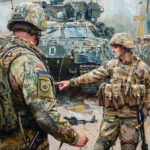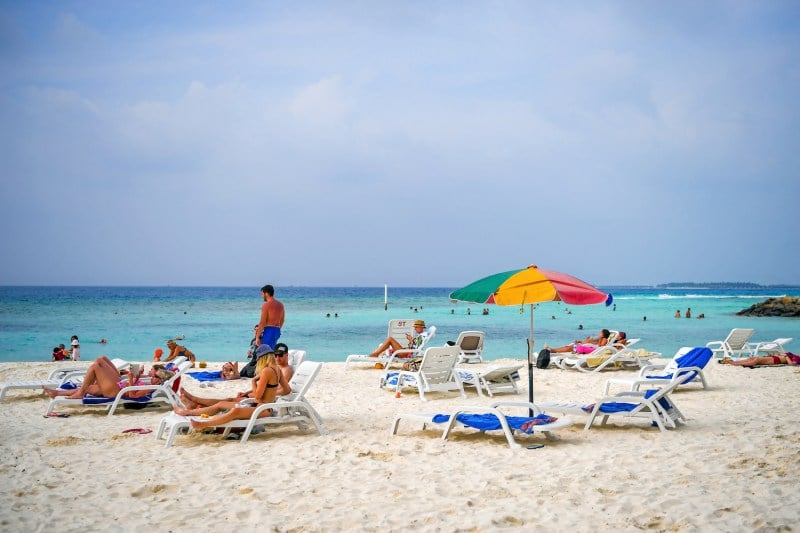Europe Pushes U.S. to Take Tougher Stance on Russia

Europe Pushes U.S. to Take Tougher Stance on Russia
U.S., French, and Ukrainian officials meet in Paris for discussions on how to end the Russia-Ukraine war.
French President Emmanuel Macron (left) shakes hands with U.S. Secretary of State Marco Rubio next to U.S. special envoy Steve Witkoff before a meeting at the Élysée Palace in Paris on April 17. Ludovic Marin/AFP via Getty Images
Welcome back to World Brief, where we’re looking at trans-Atlantic engagement on the Russia-Ukraine war, an all-out paramilitary offensive in Sudan’s western Darfur region, and Puerto Rico’s island-wide blackout.
Pressure Points
With Russia-Ukraine peace talks seemingly stalled, top Ukrainian, U.S., and European officials convened in Paris on Thursday to discuss new ways to end the three-year war. Among those in attendance were U.S. Secretary of State Marco Rubio, White House envoys Steve Witkoff and Keith Kellogg, French President Emmanuel Macron, and Ukrainian Foreign Minister Andrii Sybiha. Russian officials were not invited to attend.
Welcome back to World Brief, where we’re looking at trans-Atlantic engagement on the Russia-Ukraine war, an all-out paramilitary offensive in Sudan’s western Darfur region, and Puerto Rico’s island-wide blackout.
Pressure Points
With Russia-Ukraine peace talks seemingly stalled, top Ukrainian, U.S., and European officials convened in Paris on Thursday to discuss new ways to end the three-year war. Among those in attendance were U.S. Secretary of State Marco Rubio, White House envoys Steve Witkoff and Keith Kellogg, French President Emmanuel Macron, and Ukrainian Foreign Minister Andrii Sybiha. Russian officials were not invited to attend.
The purpose of Thursday’s conference was to discuss “paths to a fair and lasting peace, including full cease-fire, multinational contingent, and security guarantees for Ukraine,” Sybiha said. This was the highest level of trans-Atlantic engagement on the conflict since February, and it comes as the European and U.S. positions on how to deal with Moscow appear to be increasingly at odds.
Europe is hoping to use Thursday’s meetings to place the onus of peace talks on the Kremlin. Negotiations must be “aimed at ending the Russian aggression in Ukraine,” the French presidential office said, maintaining that Russian President Vladimir Putin owes U.S. President Donald Trump an answer on his proposed cease-fire deal.
Last month, Moscow agreed to a U.S.-brokered 30-day pause on strikes targeting energy infrastructure; that deal was repeatedly broken, and on Thursday, it expired. But the Kremlin has stopped short of backing a larger truce deal, which could include a Black Sea cease-fire and the return of prisoners of war. And despite several rounds of U.S. talks with Moscow—including an in-person meeting between Putin and Witkoff last week—little progress has been made.
European leaders argue that the United States needs to take a tougher line on Russia, with Kyiv and its allies raising alarm bells about Trump and Witkoff parroting Kremlin talking points. Trump has repeatedly called Ukrainian President Volodymyr Zelensky a “dictator” and falsely accused Kyiv of starting the war. And following last week’s meeting with Putin, Witkoff told Fox News that any peace deal must center on the “so-called five territories,” referring to the Crimean Peninsula as well as the four mainland Ukrainian regions that Russia has partially occupied since its full-scale invasion of Ukraine in February 2022.
At the same time, though, Europe is wary about angering the White House amid ongoing trade talks. Italian Prime Minister Giorgia Meloni represented European Union demands on Thursday when she met with Trump to discuss ways to decrease the bloc’s trade surplus with the United States.
Russia, meanwhile, condemned Thursday’s meeting in Paris. “What we see from the Europeans is a focus on continuing the war,” Kremlin spokesperson Dmitry Peskov said, and Russia’s top economic negotiator, Kirill Dmitriev, accused some countries of attempting to “derail” Moscow’s talks with Washington.
Today’s Most Read
- Why Authoritarians Attack Universities First by John Haltiwanger
- Why Beijing Thinks It Can Beat Trump by Scott Kennedy
- How to Strike Trade Deals in Record Time by Wendy Cutler
What We’re Following
Asserting power. Sudan’s paramilitary Rapid Support Forces (RSF) declared its own government on Wednesday, one day after the country marked the two-year anniversary of its devastating civil war between the RSF and the Sudanese army. The announcement coincides with a new RSF effort that began last Friday to seize complete control of the western Darfur region from the Sudanese army, leaving more than 400 people dead. The massive Zamzam refugee camp near the city of El Fasher was among the sites targeted.
Both the RSF and the Sudanese army have been accused of committing atrocities during the conflict, including targeted ethnic killings, sexual violence, and genocide. The RSF holds the majority of western and southern Sudan, whereas the army largely controls the north and east, including the capital, Khartoum.
Neither side was invited to a London-based conference on Tuesday to discuss best strategies to end the war and boost aid deliveries. However, that meeting resulted in few successes, as it failed to establish a contact group to facilitate peace talks.
Another mass blackout. More than half of Puerto Rico’s residents remain without power on Thursday as crews race to restore electricity to the entire island before the Easter holiday begins on Friday. The blackout, which began Wednesday afternoon, left 1.4 million customers without electricity and another 400,000 people without water. Power company Luma said it was triggered by a protection system failure and vegetation on a transmission line, according to a preliminary investigation.
“This is a shame for the people of Puerto Rico that we have a problem of this magnitude,” Gov. Jenniffer González said.
Wednesday’s outage was Puerto Rico’s second island-wide blackout in less than four months, with the previous one hitting on New Year’s Eve due to an outdated underground cable. Local business owners worry that such a trend could spook outside investors at a time when the territory needs economic development.
Gaza “security zones.” The Israel Defense Forces (IDF) will remain in Gaza indefinitely even after the war ends, Israeli Defense Minister Israel Katz said on Wednesday, issuing a new blow to ongoing cease-fire efforts with Hamas. “The IDF will remain in the security zones as a buffer between the enemy and the [Israeli] communities in any temporary or permanent situation in Gaza—as in Lebanon and Syria,” Katz said.
Last month, Israel resumed its military operations in Gaza in an effort to destroy Hamas and expand so-called security zones. These included an Israeli presence in the Netzarim Corridor, which splits Gaza into halves, as well as the so-called Morag Corridor, which runs between the southern cities of Rafah and Khan Younis.
More than 400,000 Palestinians have been displaced since the fighting resumed in mid-March, according to the U.N. humanitarian office, and at least 1,630 people have been killed by Israeli strikes. This does not include the more than two dozen Palestinians killed across the territory on Thursday.
Odds and Ends
India bars all outsiders from traveling within 3 miles of North Sentinel Island, whose reclusive inhabitants have remained isolated from the rest of the world for thousands of years. Yet that didn’t stop one American YouTuber from setting foot on the restricted territory. Indian officials detained 24-year-old Mykhailo Viktorovych Polyakov on Thursday for trying to contact the Sentinelese tribe on March 29 and, when that failed, leaving a can of Diet Coke and a coconut as an offering. “Outsiders meeting Sentinelese could endanger the tribe’s survival,” a senior police officer said. Under Indian law, traveling to North Sentinel Island carries a sentence of up to five years in prison and a fine.
Alexandra Sharp is the World Brief writer at Foreign Policy. X: @AlexandraSSharp
More from Foreign Policy
-

U.S. President Donald Trump gives a thumbs-up upon arrival at Joint Base Andrews in Maryland after spending the weekend at Mar-a-Lago. How to Ruin a Country
A step-by-step guide to Donald Trump’s destruction of U.S. foreign policy.
-

Chinese President Xi Jinping arrives for a meeting with Vietnamese National Assembly Chairman Tran Thanh Man in Hanoi on April 14. Why Beijing Is Standing Up to Trump
Chinese leaders have their pride, too.
-

Russian soldiers practice marching Why Don’t Russian Soldiers Revolt?
Astonishing death rates and brutal abuse have not kept troops from following orders.
-

An illustration shows a police officer trying to sudue a panicked mob of men. The Awful History of Tariffs and Depressions
What the 19th century teaches us about what happens next.








Join the Conversation
Commenting on this and other recent articles is just one benefit of a Foreign Policy subscription.
Already a subscriber?
.
Subscribe
Subscribe
View Comments
Join the Conversation
Join the conversation on this and other recent Foreign Policy articles when you subscribe now.
Subscribe
Subscribe
Not your account?
View Comments
Join the Conversation
Please follow our comment guidelines, stay on topic, and be civil, courteous, and respectful of others’ beliefs.
Change your username |
Log out
Change your username:
CANCEL
Confirm your username to get started.
The default username below has been generated using the first name and last initial on your FP subscriber account. Usernames may be updated at any time and must not contain inappropriate or offensive language.